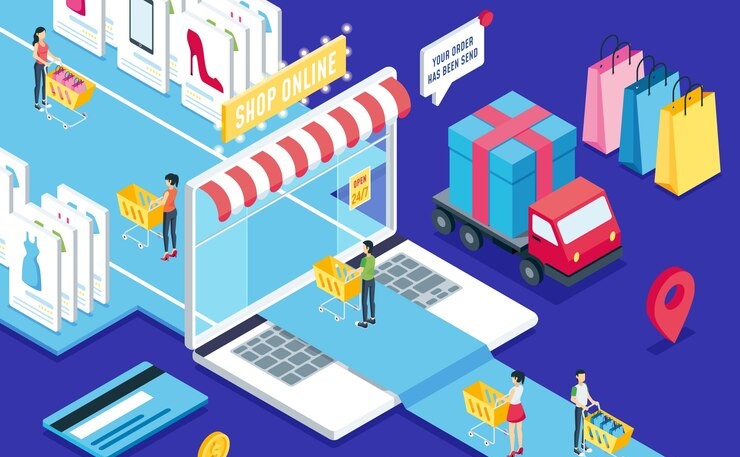Scaling Up: Retail Software Solutions for Small Businesses to Enterprise-Level

One of the many benefits of e-commerce is its digital storefronts that are open 24/7 and the potential for growth knows no bounds. Today, the success of online retail hinges on its ability to efficiently manage operations, adapt to evolving market dynamics, and scale the business seamlessly. As consumer preferences shift, technology advances, and competition intensifies, retailers must leverage scalable software solutions. Retailers ought to opt for solutions that meet their current needs and empower them to grow and succeed in the long term.
In this blog, we’ll explore the dynamic synergy between retail software solutions and e-commerce. We will also look at how retail software solutions help e-commerce businesses operate and navigate the complexities of inventory management, order fulfillment, customer service, and more.

Step into e-commerce's boundless realm: scale, adapt, thrive effortlessly
Overview of the Retail Software Industry
The retail software industry is a dynamic and ever-evolving sector that plays a crucial role in. As technology continues to advance and consumer behavior evolves, the retail software industry has become increasingly sophisticated and diverse.
One of the key drivers of growth in the retail software industry is the rising demand for omnichannel retail solutions. With consumers expecting a seamless shopping experience across online and offline channels, retailers are investing in software that enables them to integrate their brick-and-mortar stores with their online platforms. This integration allows retailers to offer services such as click-and-collect, buy online, pick up in-store, and same-day delivery, thereby enhancing convenience and customer satisfaction.
The retail software industry is poised for continued growth and innovation as retailers seek to adapt to evolving consumer preferences and technological advancements. By investing in advanced retail software solutions, retailers can enhance efficiency, optimize operations, and deliver superior customer experiences in an increasingly competitive market landscape.

Importance of Scalable Solutions for Small Businesses
Scalable solutions are essential for small businesses as they provide the flexibility and adaptability needed to grow and thrive in today's competitive market. Here are several reasons why scalable solutions are important for small businesses:
- Cost efficiency: Scalable solutions enable small businesses to efficiently manage their resources by paying only for what they need. As the business grows, they can easily scale up their operations without incurring significant upfront costs or having to invest in new infrastructure.
- Flexibility: Scalable solutions offer small businesses the flexibility to quickly adjust to changing market conditions, customer demands, and business needs. Whether it's increasing production capacity, expanding into new markets, or adding new features to their products or services, scalable solutions allow small businesses to respond effectively to growth opportunities.
- Improved performance: Scalable solutions often come with advanced technology and features that can help small businesses improve their performance and productivity. By automating routine tasks, streamlining processes, and leveraging data analytics, scalable solutions enable small businesses to operate more efficiently and effectively.
- Competitive advantage: Small businesses that invest in scalable solutions are better positioned to compete with larger competitors. By leveraging technology to improve their operations and customer experience, small businesses can differentiate themselves in the market and attract more customers.
- Risk mitigation: Scalable solutions help small businesses mitigate the risks associated with growth and expansion. By providing the infrastructure and support needed to scale up operations smoothly, scalable solutions reduce the likelihood of disruptions, errors, and other issues that can arise during periods of rapid growth.
- Future-proofing: By investing in scalable solutions, small businesses can future-proof their operations and ensure they remain competitive in the long term. As technology continues to evolve and market dynamics change, scalable solutions provide the agility and adaptability needed to stay ahead of the curve.
Scaling a business requires thoughtful, strategic planning. According to data from McKinsey, only 22% of new businesses launched in the past decade have successfully scaled. Businesses that excel in scaling meticulously evaluate how the process reverberates across all areas of the organization. Key elements include:
- Company goals: When setting goals to scale your business, focusing on both short- and long-term goals is important. Keeping in mind both outcome and process goals when planning your scaling strategy is also very important. Another key element when setting goals is remaining agile, so your team will be prepared to pivot your strategy if the market needs to shift.
- Number of team members: Businesses that scale too quickly might assume that if the goal is to double revenue, the organization also needs to double headcount. This isn’t likely to be a sustainable strategy, especially if revenue growth slows. Instead of building your team with quantity in mind, prioritize quality. Engage skilled leaders who can help oversee and motivate team members. Bring on talented individuals with the specialized skills you need to meet your business goals.
- Internal processes: A key to successfully scaling your business is implementing automation and effective standardized workflows. Having documented processes in place can have a significant, positive impact on your organization’s ability to scale.
As small businesses expand and mature, their requirements for software solutions become more complex. Transitioning to enterprise-level solutions becomes inevitable to support larger operations, multiple locations, and diverse sales channels. However, this transition must be seamless and cost-effective to ensure continued efficiency and competitiveness.

Scalable solutions by Ginesys empower small businesses to grow dynamically and sustainably
Understanding the Needs of Small Businesses
- Scalable solutions are essential for small businesses as they provide the flexibility and adaptability needed to grow and thrive in today's competitive market. Here are several reasons why scalable solutions are important for small businesses:
- Limited resources: Small retailers often operate with limited financial resources, making it challenging to invest in technology, marketing, and infrastructure upgrades necessary for growth and competitiveness.
- Market competition: Small retailers must compete with larger, more established competitors, including big stores and online retailers. This competition can make it difficult to attract and retain customers, especially without the resources for extensive marketing campaigns.
- Inventory management: Effective inventory management is essential for small retailers to avoid stockouts, overstocking, and loss of sales. However, manual inventory tracking processes can be time-consuming and prone to errors, leading to inefficiencies and lost revenue.
- Customer engagement: Building and maintaining customer relationships is crucial for small retailers, yet it can be challenging without the resources for sophisticated Customer Relationship Management (CRM) Systems or marketing initiatives. Personalized customer experiences and loyalty programs are often out of reach for small businesses.
- E-commerce competition: With the rise of e-commerce, small retailers face increasing pressure to establish an online presence. However, developing and maintaining an e-commerce platform can be costly and complex, presenting a barrier to entry for many small businesses.
- Key Requirements in Retail Software for Small Businesses
- Affordability: Retail software solutions tailored for small businesses should be cost-effective, with flexible pricing plans that accommodate limited budgets. This includes affordable upfront costs, as well as reasonable subscription fees.
- Ease of use: Small retailers often lack dedicated IT staff or extensive technical expertise. Therefore, retail software should be intuitive and easy to use, with user-friendly interfaces and straightforward setup processes.
- Inventory management: Robust inventory management capabilities are essential for small retailers to track stock levels, manage orders, and optimize inventory turnover. The software should support real-time inventory updates, barcode scanning, and automated reorder points to streamline operations.
- Sales and customer Management: Retail software should include features for managing sales transactions, processing payments, and tracking customer interactions. Additionally, CRM functionalities enable small retailers to capture customer data, segment their customer base, and personalize marketing efforts.
- E-commerce Integration: Integration with e-commerce platforms allows small retailers to expand their reach and tap into online sales channels. The software should seamlessly sync inventory, orders, and customer data between the physical store and online storefront, enabling omnichannel retailing.
- Reporting and Analytics: Access to actionable insights through reporting and analytics tools empowers small retailers to make informed business decisions. Retail software should provide customizable reports on sales performance, inventory metrics, and customer trends, enabling data-driven decision-making.

Empowering Small Businesses: Solutions for Growth and Competitiveness by Ginesys
Factors to Consider When Scaling Up
- Budgeting and Cost Analysis- As businesses grow, it's crucial to reassess budgeting and conduct thorough cost analysis. This involves considering initial investment, ongoing expenses, and potential ROI.
- Integration with Existing Systems- Seamless integration with existing software systems is essential to avoid disruptions and ensure smooth operations during the scaling process.
- Training and Support for Employees- Providing comprehensive training and ongoing support for employees is vital for successful adoption and utilization of new software solutions.
- Training and Support for Employees- Maintaining robust security measures and ensuring compliance with industry regulations becomes increasingly important as businesses expand.

Mastering Key elements for successful scaling up with Ginesys
7 Tips for scaling a business
- Strategize how to increase sales- Scaling sales can mean either adding new customers or growing the average revenue from current customers. While both options drive results, expanding your relationship with current customers is often more cost-effective than attracting new business. On average, getting a new customer can cost six to seven times more than keeping and engaging customers you already have.
- Invest in technology- A global study from Automation Anywhere found that the average worker spends roughly 40% of their day on manual administrative tasks. With the right technology, many of these tasks can be automated, freeing up time for team members to focus more on broader business goals and strategic priorities. This is critical to scaling a business because you can drive improved business outcomes among the team members you already have on board.
- Expand your team according to the market’s needs- As you map out the team you need to scale your business, the first step is determining the skills required to meet your goals and identifying any skills gaps you have on your team. Think about specific hard and soft skills that will help your organization drive business outcomes and best support customers.
- Create a plan around realistic goal- Businesses that effectively scale strike the right balance between setting reasonable, yet challenging goals. Once the leadership team aligns on goals, communicate your plan with the entire team to get everyone on board. When setting a plan or timeline to achieve goals, keep in mind seasonality throughout the year. Have a plan in place to account for the slower periods as you break down your milestones for each month or quarter.
- Develop management skills- Managers at your organization are responsible for motivating team members and achieving independent team goals—as well as holding team members accountable for outcomes. Individual managers’ effectiveness can have a direct impact on your organization’s likelihood to successfully scale. Therefore, managers across departments need to have the right skills to drive positive business outcomes.
- Focus the company’s offerings- Organizations that successfully scale understand the importance of focusing their products, services, and target market. This can position your business to better meet the needs of your core customers, stand out from the competition, and become a market leader. Your organization should continuously evaluate the market, the latest technology, and your customers’ needs, and evolve your offerings over time to scale your business long-term.

Best Practices for Successful Implementation by Ginesys
Scaling up your retail software solutions from small businesses to enterprise-level requires meticulous planning and execution. Ginesys, a leader in retail technology, offers invaluable insights into best practices for successful implementation.
- Setting Clear Objectives and Goals- Before embarking on any software implementation journey, it's crucial to define clear objectives and goals. Determine what you aim to achieve with the new retail software solution. Whether it's streamlining operations, enhancing customer experience, or improving inventory management, clarity in objectives sets the foundation for a successful implementation. Ginesys advocates for comprehensive goal setting, ensuring alignment across all stakeholders to drive the implementation forward with purpose and direction.
- Choosing the Right Vendor- Selecting the right vendor is paramount for the success of your retail software implementation. Look for a vendor with a proven track record in delivering scalable solutions tailored to your business needs. Ginesys stands out in this regard, offering not just software but a partnership focused on understanding your unique requirements and delivering customized solutions. Evaluate vendors based on factors such as expertise, support capabilities, and their ability to adapt to your evolving needs over time.
- Customization vs. Out-of-the-box Solutions- One of the critical decisions in retail software implementation is choosing between customization and out-of-the-box solutions. While customization offers tailored solutions to fit specific business requirements, it can sometimes lead to complexity and higher costs. On the other hand, out-of-the-box solutions provide quick deployment and cost-effectiveness but may lack the exact features your business demands. Ginesys emphasizes striking the right balance between customization and out-of-the-box functionality, ensuring that your retail software aligns perfectly with your business processes without unnecessary complexity.
- Monitoring and Evaluation of Performance- The journey doesn't end with implementation; continuous monitoring and evaluation of performance are essential for long-term success. Ginesys advocates for establishing robust performance metrics from the outset and leveraging analytics tools to track key indicators. Regular performance evaluations allow you to identify areas for improvement, optimize processes, and ensure that your retail software continues to drive value across your organization.

Retail Revolution: Ginesys' Proven solutions for Seamless Implementation
The future of retail software solutions lies in their ability to adapt to evolving business needs. Successful implementation of retail software solutions requires a strategic approach encompassing clear goal setting, careful vendor selection, thoughtful customization, and ongoing performance monitoring. For small businesses embarking on their scaling journey, Ginesys offers tailored solutions designed to streamline operations, maximize efficiency, and facilitate growth. With a focus on scalability and reliability, Ginesys empowers businesses to thrive in an increasingly competitive market landscape. With Ginesys as your partner, you can navigate these challenges with confidence, experiencing the full potential of your retail operations from small businesses to enterprise-level.
